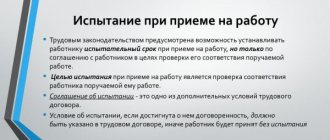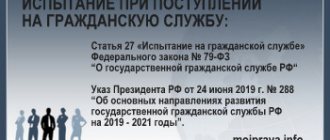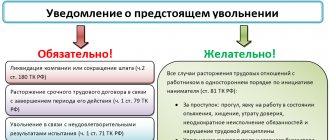Working during a probationary period differs little from permanent work. It is also included in the length of service, is paid according to the terms of the employment contract, and the employee performs his duties on an equal basis with colleagues. However, there are a number of differences. These include the procedure for dismissal. One of the most controversial issues among employees is whether a citizen has the right to resign during the probationary period, and what should be the sequence of his actions.
Important
The Labor Code of the Russian Federation regulates the procedure for the relationship between the employer and the employee during the trial period in articles and.
Can they be fired during the probationary period?
Often, when hiring a new employee, the terms of the contract specify a period during which his professional qualities can be identified and assessed.
This period of time helps the parties understand the feasibility of further relationships. The probationary period may vary in length depending on the position held. A probationary period is not provided for:
- pregnant women;
- women raising children under 1.5 years of age;
- persons under 18 years of age;
- graduates of educational institutions.
Employees under fixed-term contracts with a duration of no more than 2 months, as well as persons hired by transfer, and other citizens do not fall into this category (Article 70 of the Labor Code of the Russian Federation).
NOTE! The employer has the right not to require confirmation of the status of the persons listed above. Therefore, the employees themselves must present documents confirming this situation.
A probationary period is established only when hiring a new person. If there is a need to transfer an already working employee to another position, a probationary period is not provided.
The duration of the probationary period and other conditions should be specified in the employment contract, and also reflected in the order when hiring. Further changes to these conditions are permitted only by agreement of the parties.
For most employees, the duration of the probationary period is 3 months; at its discretion, the employer may limit it to a shorter period. For applicants for management positions, including chief accountants, the probationary period can be extended to 6 months. If the contract is concluded for a period of 2 to 6 months, the trial period lasts up to 2 weeks.
The reasons for dismissal during a probationary period may be the same as for termination of a contract in other situations. Moreover, in case of unsatisfactory performance of the hired employee, the employer has the right not to pay severance pay.
Find out about other dismissal options from the material “How to properly arrange leave followed by dismissal?”
For more information on how to make the final payment upon dismissal, see the material “Calculation of compensation for unused vacation under the Labor Code of the Russian Federation” .
Not only dismissal during a probationary period, but also dismissal of a missing employee has important features. And ConsultantPlus experts talk about them in detail. Get free demo access to K+ and go to the Ready Solution to find out all the details of this procedure.
Dismissal procedure
In order for the dismissal to occur without claims, both parties who previously signed an agreement for a probationary period must comply with all legal formalities and the sequence of actions prescribed by law:
- The procedure begins with the submission of an application notifying the employee’s desire to stop working. It is written in the name of the management. The document must contain the date on which the employee wishes to stop working. The signature and date of submission of the document are placed at the bottom. As noted above, the document is submitted three days before departure (this date is recorded next to the signature on the application). Leaving “of one’s own free will” is indicated as the basis. The application is written in two copies at once, which are registered in the office. After receiving the application, management is obliged to issue an appropriate order, referring to the submitted application indicating its registration number. The employee must familiarize himself with the published document and put his signature on it.
- After which a note is made in the work book with a reference to the provisions of the Labor Code (“according to Article 77 of the Labor Code”) and the order number is indicated. A copy of the order is sent to the accounting staff to carry out calculations - unpaid wages and unused days of allotted vacation are taken into account. All notes about the employee’s departure are also entered into accounting forms, if any are maintained at the enterprise (T-54 and T-2). Here it is necessary to indicate the basis for the calculation - Article 77, and note the compliance of the procedure with all the provisions of Article 71 of the Labor Code.
- The calculation is made on the day of termination of employment, specified in the management order and the employee’s application.
- On the same day, the employee is given a work book and other documents (at the request of the dismissed person!), which are of a reference nature. For example, about the average salary or insurance premiums paid by the employer. In this case, a copy of the work book remains in the archives of the enterprise or organization.
Mandatory payments to an employee are formed:
- from unpaid wages (if any at the time of calculation);
- from compensation for unused vacation days in the current year.
It should be borne in mind that the subject has the right to receive vacation days, like any other employee of the enterprise, but full vacation can only be accrued to him in the case of continuous work for six months. Therefore, when calculating, we cannot talk about paying for all vacation days, unless this is provided for in the contract. Vacation days will be given in proportion to the time worked. It is for this shortened period that compensation payments are accrued.
Days spent on sick leave are also paid.
And when making calculations, it is necessary to take into account not only the period actually worked, but also the total length of service available to the employee and including work at other enterprises.
Severance benefits are usually not accrued to persons who terminate their employment of their own free will. The exception is loss of ability to work, conscription for military service, or resignation caused by violations of labor legislation or the provisions of the employment contract by the management of the enterprise.
Severance pay upon dismissal by agreement of the parties is usually not paid unless it was specified in the employment or collective agreement. In what cases can an employee be deprived of a bonus? Read more about this in our article.
Remuneration for shift work is a complex issue. You can study it in detail here.
How to dismiss an employee during the probationary period and after it at the initiative of the employer?
Hiring an employee with a mandatory probationary period is accompanied not only by a record of this condition in the employment contract. It is necessary to draw up a list of requirements and tasks, the fulfillment of which is mandatory for further enrollment in the staff. Successful completion of the probationary period includes, among other things, the solution of all tasks assigned to the employee.
If an agreement was initially concluded with the employee, which does not stipulate the existence of a probationary period or there is no separate written agreement on this condition, termination of the agreement as dismissal during the probationary period can be easily contested.
Dismissal of an employee during a probationary period, committed at the initiative of the employer, must be accompanied by a warning to the employee about the upcoming fact 3 days in advance (Article 71 of the Labor Code of the Russian Federation). To do this, the employee is given a written notice containing the reasons for dismissal and the date of termination of the contract.
Determining the timing of the test has its own characteristics. This period is set in calendar days, including weekends and holidays. However, the absence of an employee from the workplace due to other situations, including illness and unknown reasons, is not included in the probationary period.
If the end of the probationary period falls on a non-working day, then the last day of performance of official duties in this status is considered to be the previous working day. That is, if the employer nevertheless decides to dismiss the employee during the probationary period, then the notice will need to be given in advance.
As soon as the probationary period comes to an end, the employee is considered accepted for the position, unless otherwise specified in the employment contract. The simplified dismissal procedure available to employers during a probationary period is no longer valid, and the employee is subject to the rules in force for ordinary employment.
Let's consider whether they can be fired if the employee fails to cope with the assigned obligations and the probationary period has not yet ended.
Who cannot be fired during the probationary period?
The legislation strictly limits the list of employees with whom the employment contract cannot be terminated during the probationary period. These categories include:
- Persons who do not have a probationary clause in their employment contract;
- Persons whose probation period has expired;
- Employees for whom there is a ban on dismissal at the initiative of the company: pregnant women; single mothers; citizens on sick leave;
- Citizens for whom there is a ban on testing them.
Termination of the contract with these persons will be a violation of labor legislation, entailing the application of administrative penalties.
Dismissal of an employee for failing to complete the probationary period
The employer has the right to terminate the contract with an employee who has failed to cope with his duties during the probationary period and has also shown himself to be unable to perform further work.
Dismissal during the probationary period can be carried out before the end of this period. The employer can terminate the contract with a new candidate at the very beginning of his work. However, the fact of non-compliance with the position held by the employee will have to be confirmed.
A selection of court decisions on confirmation by the employer of an unsatisfactory test result upon dismissal is given in the ConsultantPlus system. You can get a free trial and see the possible risks.
Before dismissing an employee who has not completed the probationary period , he should be given a notice of dismissal. To do this, the employer issues a notice of the upcoming termination of the employment contract. It must indicate the reasons why the employee was found to have failed the test.
A sample of such a notification was developed by ConsultantPlus experts. Get free trial access to the system and see how to prepare such a document.
The employee must be notified 3 days before the order is issued. This period, as well as the basis for terminating an employment contract with an employee who has not passed the test, is valid only during the probationary period. After this period, if management does not take any action towards the hired employee, it will no longer be possible to dismiss him under the same conditions.
The following periods do not apply to the probationary period:
- vacation (including at your own expense, educational);
- periods of incapacity;
- periods of downtime in production if the employee is absent at this time with the knowledge of management;
- suspension from work;
- performance of state or public duties;
- absence from work for unknown reasons.
You can read more about registering absenteeism from work in the article “How to properly register absenteeism for an employee under the Labor Code of the Russian Federation?”
Employee business trips are included in the probationary period. Moreover, based on the results of completing travel assignments, one can judge the employee’s suitability for the position held.
During the entire period of the employee’s probationary period, the employer will need to record the facts of completion or non-fulfillment of tasks, confirming everything with documents. If conflict situations arise, the employer, during dismissal during the probationary period, can, with the help of such documents, provide irrefutable arguments in favor of the employee’s incompetence.
Evidence of unsuccessful completion of the probationary period may include information from the following sources:
- reports of unsatisfactory product quality;
- memos and reports from immediate superiors and other employees about the unsatisfactory quality of work of the tested employee;
- minutes of the meeting of the commission to discuss the results of the probationary period;
- employee reports on the results of his activities.
If during the probationary period disciplinary measures were taken against the employee, then these facts can also serve as evidence of his inadequacy for the position held.
In addition, the tested employee must be familiarized with the internal regulations, job descriptions and other local regulations against receipt.
More detailed information about the responsibilities of HR employees at an enterprise can be found in the material “HR records management from scratch - step-by-step instructions.”
Entry in the work book
An employee is most often fired when he fails to fulfill his responsibilities within the time given to him. After the order is approved, an entry is made in the work book that the specialist is fired. The employer makes a note in it that the employee has not passed the conditions of the probationary period and is released from his position.
Attention
The labor document also notes that dismissal from office occurs under Article 71, since the person has not passed the conditions of the probationary period.
If the dismissal is formalized at the initiative of the employee, then the employment contract states that the employment contract was terminated at the employee’s own request.
Results
If an employee has not completed the probationary period, every employer should know how to fire him without breaking the law. There may be slightly more grounds for dismissal during a probationary period than with the usual termination of a full-time employee’s contract at the initiative of the employer. However, the amount of payments may be less. The employee also has the right to quit if the new place and working conditions are not suitable for him, without undergoing mandatory work for a period of 2 weeks.
However, do not forget about the length of the probationary period, after which you will have to terminate the employment contract on a general basis.
You can find more complete information on the topic in ConsultantPlus. Free trial access to the system for 2 days.
Documents issued upon dismissal during probation
On the last working day, the employee must receive a certain list of documents. It includes:
- Employment history;
- Certified extracts from the following forms: SZV-M;
- SZV-STAGE;
- DSV-3 – when transferring contributions to the funded part;
- Section 3 of calculation of insurance premiums.
It is advisable to issue certificates in writing against signature. To do this, you can make an inventory of all the transferred papers, let the employee read it and sign it. Moreover, if the dismissed employee later turns to the employer for these certificates, he will be required to issue them within 3 days from the date of application.
Also, for former employees liable for military service, it is necessary to send to the military registration and enlistment office information in accordance with Appendix 9 to the Methodological Recommendations for maintaining military records in organizations (approved by the Russian Ministry of Defense on July 11, 2017).
Entitled payments to a subordinate
All employees have equal and identical rights, regardless of whether they are employed according to the basic form or are undergoing testing of their professional suitability. Upon termination of the contract, subordinates can claim wages for the time they worked and compensation payments for days of unused rest.
Only those subordinates who have worked for a year are entitled to full leave. People on a trial period have the right to receive cash payments in proportion to the time worked.
Information
For example, a citizen who works for 2 months and 4 days will receive compensation for rest according to two months. The same amount will be paid to an employee who has worked for 1 month and 27 days. These are general payment procedures - if the work period is less than half a month, these days are not included in the calculation. If more than 15 days, round up to a full month.










